- Home
- Brian Keene
The Rising: Selected Scenes From the End of the World Page 12
The Rising: Selected Scenes From the End of the World Read online
Page 12
Mike felt a pang of regret. What if, indeed?
Could they possibly be the last living humans? No, there had to be others, maybe hiding underground like they were, unaware that the zombie plague was over. He wondered if there were other fathers out there, battling to get to their sons or loved ones. If so, he wished them luck.
“I don’t know, Kyle. But we’ve got each other. If there is anybody else left, they probably can’t say the same.”
“I love you, Dad.”
The boy rarely said it anymore, and Mike’s eyes watered.
“I love you, too.”
“So what do we do now?”
Mike shrugged. “We go home. Carefully, until we’re sure the zombies are dea—gone. We’ll see if our car is still in the parking lot. If it is, we’ll take 90 to 71, and then hop on I-10.”
“Good. I’m sick of these caves.”
They stepped out of the shadow of the cavern mouth and started down the trail. The treetops and grass swayed back and forth, rustling softly.
“You know what I want?” Kyle asked. “Pizza.”
Mike chuckled. “Yeah, now that you mention it. Beat’s those cold beans we’ve been eating.”
They continued on. Twenty-seven days of living in the cave had hardened them both, but Mike was still tired. Sweat ran into his eyes and he wished for a cool breeze. Despite his exhaustion, he felt good.
“Everything’s going to be okay.” Mike mopped his brow. “We outlasted them.”
Kyle didn’t respond.
The plant life continued rustling.
How, Mike suddenly thought. There’s no wind…
“Dad?”
Mike stopped. Kyle was pointing at something ahead of them. Mike looked. At first, he didn’t understand what they were seeing. An armadillo, still alive and not a zombie; lay twitching on a rock. A black cloud swarmed around it. The cloud buzzed.
“Mosquitoes,” Mike said. “What the hell?”
Kyle screamed.
His legs had turned black, as thousands of ants crawled up them, covering his shoes and pants. Kyle slapped at the creatures and his hands came away covered.
“Dad, get them off me!”
Stunned, Mike beat at the insects, brushing them from his terrified son’s legs. Smashed ants littered the trail. Crushed, their bodies still impossibly twitched.
“Oh Jesus…” Mike moaned. “They’re zombies. Kyle, run! Back to the cave!”
Pushing Kyle ahead of him, Mike glanced back. The mosquitoes forgot about the armadillo and darted towards them. The trail was covered with ants. When he looked back toward the cave, the insects blocked their path, surrounding them.
“Dad—”
“Get off the trail.” Mike shoved him onto the grass. “Keep running!”
The zombies didn’t disappear, he thought. They just changed. It’s not the humans and animals anymore. It’s the fucking bugs!
They ran through the grass, biting ants still clinging to their extremities. Beneath their feet, the grass moved. Yellow lilies stretched towards them, whipping at their legs. Overhead, the tree limbs groaned. The leafy canopy hissed.
Mike tripped, crashing to the ground. Sprawled on the grass, he gasped for breath. Kyle stopped to help him and the mosquitoes surrounded the boy’s face.“Keep going,” Mike shouted. “I’m okay!”
Mike felt the individual blades of grass probe beneath his clothing, entwining around his fingers and ankles.
“Run, Kyle!”
With one last, lingering look, Kyle did, speeding towards the cave mouth, frantically slapping at the hungry insects.
Mike sat up. A vine wrapped around his arm and tugged. Mike tore away and sprang to his feet. More vines encircled him. There was a horrible, wrenching groan behind him. He whirled around and gasped.
Slowly, ponderously, the trees were stalking towards him, tip-toeing along on their tendril-like roots.
Screaming, Mike ripped free of the clinging vines and fled for the cave. He leapt through the mouth. Cool darkness surround him.
“Kyle?”
His voice echoed back to him.
“KYLE!”
“I’m here.” Despite the boy’s age, his son’s voice sounded small and afraid.
Mike’s did, too.
They found each other in the darkness, and returned to their camp inside the cave’s interior. Mike lit their kerosene lantern, and they checked each other for damage. Both were covered in hundreds of insect bites, and the vines had left ugly, red welts on Mike’s arms.
“Dad? There’s no plants in here, right?”
Mike shook his head.
“And bugs don’t live inside caves, right?”
“No,” Mike lied, closing his eyes. “No they don’t.”
At the edges of the lantern’s glow, the cavern floor began to move.
Darkness scuttled towards them.
Outside, the Elilum reigned over all.
BEST SEAT IN THE HOUSE
The Rising
Day Twenty-Nine
Cashmere, Washington
“Something’s happening.”
Chris Hansen put down his Stephen Crane collection and looked up at Francesca. She stood at the window, the sunlight reflected on her skin. For a second, Chris found it hard to breathe. She looked beautiful, even after living barricaded inside this house, with no showers and very little to eat. She was slender with long dark brunette hair and big brown eyes. The only thing missing was her great smile.
Francesca hadn’t smiled in a long time. Chris nudged the sluggish wheelchair towards her. It was less responsive. The batteries were almost dead. And with the electricity out, there’d be no way to recharge them.
“What is it?” he asked.
Francesca didn’t reply.
They hadn’t seen a zombie for three days. The last one to approach the house had collapsed in the driveway, literally falling apart. The arms fell off and the abdomen popped like a balloon. When Francesca crept outside to investigate, she said the insects burrowing through the rancid flesh were fighting with each other. Chris had scoffed at this.
“So what is it? Not more zombies?”
She shook her head. “Something else…something…weird.”
Chris was thirty-eight years old and had been a quadriplegic for the last eighteen. He had good use of his left arm (except for the fingers), but very limited use of his right. He could not feel his skin or use any muscles below his collarbone. Dead from the neck down, he’d once said. Sometimes he was envious of the dead outside. Unlike him, they could still move.
He looked out the window, and gasped. The trees were dying. Their house sat in the middle of a flat square acre. As they watched, the grass died—and then came back. There was no clear way to describe it. Like a wave on an ocean, a patch of brown rippled across the lawn. In its wake, the grass then turned green again—but it moved. The grass moved, each blade waving like an individual tentacle. The same thing was happening to the trees—tamarack, pine, fir, and blue spruce—each died and was resurrected. They ripped themselves free of the soil and clambered away on their roots. Thankfully, none of them realized there were two humans less than twenty-five feet away.
“It’s spreading,” Chris whispered. “Maybe nobody’s going to come after all.”
“They’ll come.” Francesca wheeled him into the kitchen. “The Rising is over. We’ve stayed inside for twenty-nine days. All we have to do is stay inside for a few more.”
“Not like either one of us were social butterflies anyway.” Chris grinned, trying to take his mind off the strange occurrences outside.
Before Francesca came into his life, Chris had barely left the house in over ten years. They’d met online when he’d purchased some books from her on eBay. Like him, she was reclusive, wading through and waiting on life. After three months of phone calls and emails, Chris invited her to visit. A month later, Francesca left the east coast behind and moved in with him.
Every day since then was magic. Sun
shine. Life.
Chris felt alive with her.
“I’ll make you lunch,” Francesca said. “It’s good that you don’t eat much. We’re almost out of food.”
Chris ate little at mealtimes to avoid getting fat, which was a quad’s worst enemy (other than pressure sores and bladder infections).
“What’s left?”
She held up two cans. “Corn or Spam.”
“Crap.”
“You are always grumpy at lunch and dinner. Why do—”
She screamed, dropping the cans.
“What?” Chris’s eyes darted back and forth.
“What’s wrong?”
“The cactus.” Francesca’s face was pale. She pointed to a small pot on the windowsill. “It’s moving.”
Chris tried to stay calm. “The trash. Throw it in the trash.”
She did, holding the cactus pot at arm’s length. Then she went through the rest of the house and did the same with the other plants. The philodendron’s long vines wrapped around her arm, the heartshaped leaves caressing her skin. When it was over, Francesca wept.
“Maybe you’re right,” she cried. “Maybe no one is coming to save us.”
“Come here.”
She did. She sat in his lap. Chris’s cushion made a farting noise. They both giggled.
He wheeled them back to the big window, and the chair finally died.
“Well,” he said. “I guess this is as good a spot as any.”
Twenty-five feet away, on top of a four-foot high hill in the front yard, was a huge waterfall with a pond. Water splashed over several big rocks that Chris’s father had put there years before. A huge, black cloud hovered over the rocks.
Mosquitoes. More mosquitoes than either had ever seen. Another cloud, larger and darker, swooped down from above. Bees. The two groups began battling.
“What’s happening?” Francesca draped her legs over the side of the chair. “I don’t understand.”
“It’s spread. Think about it. First, it was the humans and the animals. But that stopped. Remember the zombie that just fell apart on the sidewalk two days ago? That was the end of that… wave. But now it’s affecting the plants and the insects. Look. They’re going after each other, just like the other zombies did.”
Francesca stayed silent. She shifted against him, and though he couldn’t feel it, her soft buttocks cradled Chris’s groin.
“I love you,” he whispered.
“I love you, too.” Her breath tickled his ear. She stroked his thinning hair.
Outside, the yard grew thick with praying mantises, ants, hornets, ladybugs, and other insects, all fighting to the death. The grass struck out at them, but the sheer number of insects was overwhelming. Francesca stirred. “Can they get inside?”
“No,” he lied. “We’re safe.”
Chris knew he should be afraid, but he wasn’t. He felt safe. Secure. Warm. He sensed that Francesca was beginning to feel the same way. She relaxed, snuggling against him. He wrapped his left arm around her.
“You’re the best thing that ever happened to me,” he told her. “Do you know that?”
“As are you. I’d be lost without you, Chris.”
“I’d be lost without you, Francesca. You’ve given me so much. You taught me how to live.”
“You taught me how to love.”
“You’re my reason to live.”
They kissed for a long time. When Chris opened his eyes, the insects were crawling over the window. Sitting in the chair from which Chris had spent so much time, from which he’d viewed the world around him, viewed life itself, the two of them held one another and watched the world die. They were content and happy and unlike everything around them, their love was eternal. It did not die.
* * *
AMERICAN PIE
The Rising
Day Thirty
Drammen, Oslo, Norway
“I’m so glad you speak English,” the American said. “I haven’t talked to anybody alive in almost two weeks.”
Trygve Botnen nodded. “I haven’t seen anyone either. Just the dead, and I don’t like talking to them. But yes, having visited forty-six different states in the last six years, I’d like to think my English is pretty good.”
“You go there on business?”
“Vacations,” Trygve said. “I’m the…I was the Vice President of ABN AMRO Asset Management’s real estate division, but when I went to the states, it was mostly for pleasure.”
“Ever been to New York?”
“Sure.”
“I’m from New York. Came over here on vacation. I’m an angler. I’ve fished all around the world. Wanted to fish the Drammen River, all the way down to the Svelvikstrømmen. I rented a cottage, and was here two days when it happened. I waited a few more days before deciding to head back to the States, but I couldn’t go home, because by then, there was no home to go back to. They’d stopped all air travel.”
There was a rustling sound outside and both men immediately fell silent. Trygve crept to the window and peeked. A brown, desiccated vine dragged itself across the wall, slowly curling. As he watched, it stopped moving.
They were hiding in a gift shop outside the world-famous Spiral Tunnel. Trygve had arrived an hour ago, wearing a beekeepers outfit to protect him from the marauding undead insects, and a flamethrower to contend with the zombie plants. He was tired, hungry, and thirsty, and when he found the American, his spirits soared.
“I’m Don, by the way.” The American stuck out his hand. “Don McClain.”
Trygve shook his hand. “Wasn’t there an American singer with the same name?”
Don nodded. “Yep. ‘Bye bye Miss American Pie, drove my Chevy to the levee but the levee was dry.’ I think he spelled his last name different though.”
Trygve’s stomach rumbled. “I could go for some American Pie right now. Any kind of pie.”
Don laughed. “I don’t have any food, but there’s water, if you’re thirsty?”
“Please.”
Trygve brought the canteen to his lips. The water was warm and oily, but it was the sweetest he’d ever drunk.
“So,” Don asked. “Any ideas on what to do next?”
“They are dying off.” Trygve sealed the canteen and wiped his lips. “The zombies. The people and animals stopped moving a few days ago. They’re just regular corpses again. And the same thing seems to be happening with the plants and insects now. They’re moving slower, not attacking. The last few miles here, I wasn’t attacked by anything.”
“What if they come back? Maybe this is some form of hibernation, or transformation.”
Trygve shrugged. “My plan all along was to make a wilderness walk up Kjøsterudjuvet. Get high up into the mountains, where there is snow all year, and live there.”
“But the zombies would find you there, too. The mountains are just as dangerous as the cities—maybe more.”
Trygve shrugged out of his beekeeper’s outfit and coat, and leaned back against the wall. He performed a cursory check of his weapons: flamethrower, two pistols, and a long, sharp knife.
“I don’t think they would,” he said. “What are the zombies? Reanimated corpses. Cut off an arm or a leg, and they keep coming. They’re dead. But yet they move. Function. My theory is this—if I get to some place where the temperature is below freezing, the zombies can’t move. After all, since they’re dead, they have no body heat, nothing to keep their blood and tissues from freezing. If they tried to invade such a region, they’d stop in their tracks, frozen into place.”
His stomach rumbled again. It had been five days since Trygve had last eaten, and fourteen days since he’d had more than a mouthful at a time. He’d lost weight, and looked much older than his thirtythree years of age. The last month had been hard on him, to say the least.
Don looked thoughtful. “Well, I’m not a biologist or a scientist, but I guess that makes sense. If their blood and stuff freezes, then they can’t move. Could we make it into the mountains?”
Trygve nodded. “As long as they stay in hibernation, yes. We can find a vehicle and be there in a few hours. Then we’ll climb.”
“Climb?”
“I’ve hiked in the Himalayas. I can teach you how.”
“Well, shit!” Don grinned. “Let’s go now. I’m tired of hiding out in this gift shop.”
“Sleep now,” Trygve suggested. “We’ll leave tomorrow morning. Find some food first, and then set out on our journey.”
Don rubbed his stomach. “Food. That would work. I miss pancakes and bacon. God, I’m hungry.”
“Yes,” Trygve agreed. “Me, too.”
They made small talk for a while longer. Trygve sharpened his knife and Don prattled about all the foods he missed. After a while, the American’s eyes grew heavy, and he stifled a yawn. Trygve smiled.
“Sleep, my friend. I’ll stand watch.”
Don didn’t argue with him, and soon, he was fast asleep, snoring softly.
Trygve waited for ten more minutes, making sure the American would not wake. Then, when the hunger pangs in his stomach grew unbearable, he slid forward, put the knife’s blade to Don’s throat, and sliced. Blood spattered across Trygve’s face. Don’s eyes flew open. He grasped at the gaping wound, his fingers coming away slick with blood. Trygve held him down, and waited for him to die. It didn’t take long.
When it was over, Trygve stripped off the man’s clothing and went to work, skinning and cleaning the body, cutting him up like a cow in a butcher’s shop…steaks, chops, thighs—meat.
He drooled through the entire grisly task. Finished, he pulled some plastic freezer bags out of his backpack, and slipped the meat inside. He left a large section of breast out, started a fire, and cooked it over the open flame.
“I’m sorry, my friend, but it is a long journey into those mountains, and I don’t know how much food I’ll be able to find.”
Whistling the tune the American had been singing, Trygve Botnen sank his teeth into the flesh, closed his eyes, and sighed with delight. He slept soundly that night, his belly full. Outside, in the night sky, a new star appeared. It grew brighter and bigger by the hour. The temperature began to rise.

 The Rising
The Rising Entombed
Entombed Take the Long Way Home
Take the Long Way Home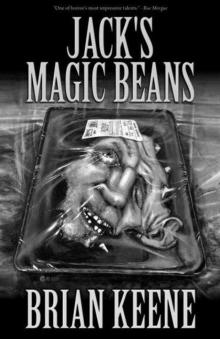 Jacks Magic Beans
Jacks Magic Beans Ghost Walk
Ghost Walk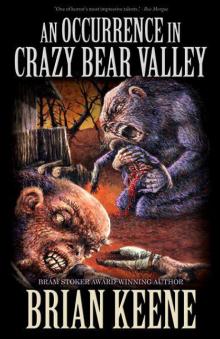 An Occurrence in Crazy Bear Valley
An Occurrence in Crazy Bear Valley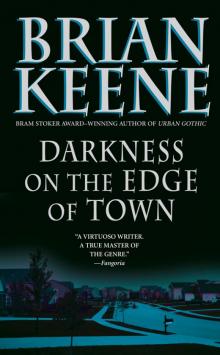 Darkness on the Edge of Town
Darkness on the Edge of Town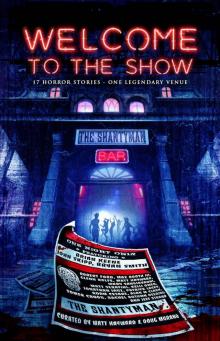 Welcome to the Show: 17 Horror Stories – One Legendary Venue
Welcome to the Show: 17 Horror Stories – One Legendary Venue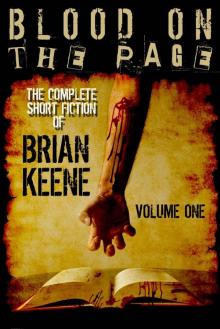 Blood on the Page: The Complete Short Fiction of Brian Keene, Volume 1
Blood on the Page: The Complete Short Fiction of Brian Keene, Volume 1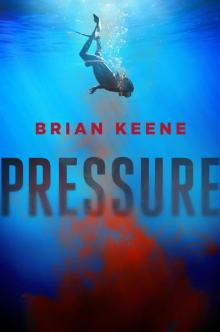 Pressure
Pressure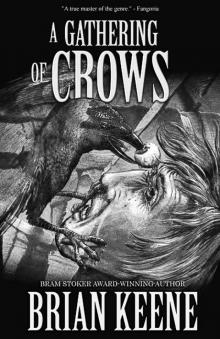 A Gathering of Crows
A Gathering of Crows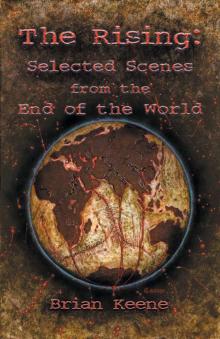 The Rising: Selected Scenes From the End of the World
The Rising: Selected Scenes From the End of the World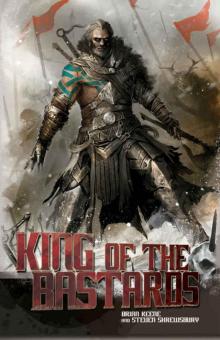 King of the Bastards
King of the Bastards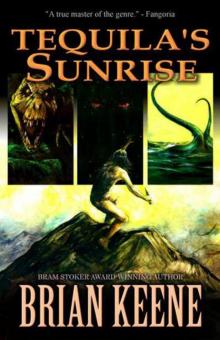 Tequila's Sunrise
Tequila's Sunrise All Dark, All the Time
All Dark, All the Time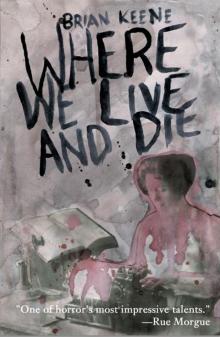 Where We Live and Die
Where We Live and Die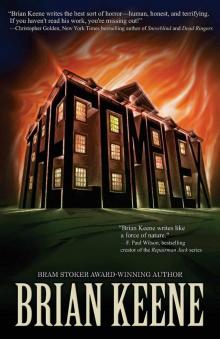 The Complex
The Complex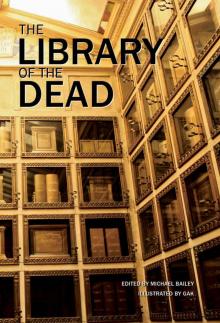 The Library of the Dead
The Library of the Dead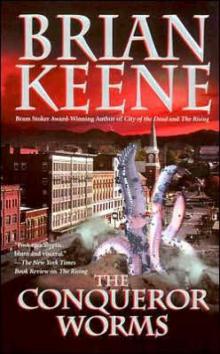 The Conqueror Worms
The Conqueror Worms The Girl on the Glider
The Girl on the Glider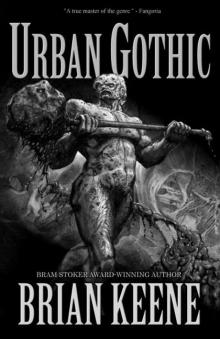 Urban Gothic
Urban Gothic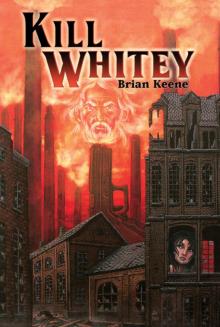 Kill Whitey
Kill Whitey Terminal
Terminal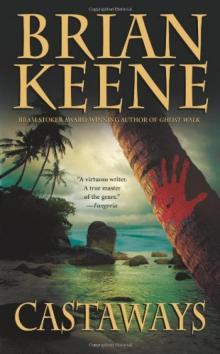 Castaways
Castaways